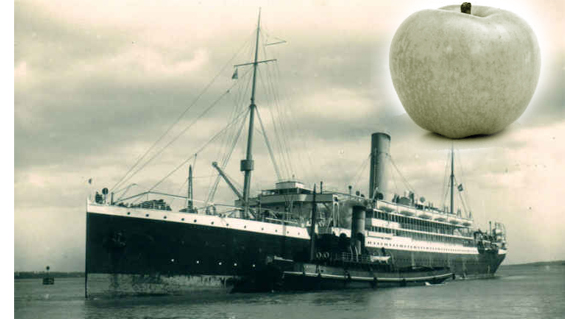The New York Times, October 2, 1921 – Included in the cargo of the Royal Mail liner Oropesa, which sails for Southampton this week, are several barrels of choice Newtown pippins consigned to a well-known London dealer, who supplies fruit to some of the most distinguished families recorded in Burke’s Peerage. This famous apple is said to be much in vogue among fashionable English folk, having for more than sixty years enjoyed the favor of royalty.
The Newtown pippin received its formal introduction into high society in England in 1861, when Charles Francis Adams, then United States Minister at the Courts of St. James’s, presented to Queen Victoria a large barrel of the luscious fruit that had been grown in a Massachusetts orchard. Although relations between Great Britain and this country were considerably strained a few weeks later by the Trent case – one of the most sensational incidents of the Civil War – the apples, nevertheless made their appearance on the royal table and made such a favorable impression that from that time on a consignment of them was forwarded every Fall from New England to Windsor Castle.
Since 1861, when the Royal Mail liner Dee carried Mr. Adams’s celebrated barrel of Newtown pippins to England, the American apple has steadily grown in favor with the British public. Sixty years ago American apples were almost unknown in England; today they are sold in all the English fruit stores and every fruit lover in England is munching them.
By reason of its larger size and superior flavor, the American apple has completely ousted its English rival and whether as an article of dessert or for use in the popular English deep-dish pie, it now reigns supreme. The explanation is simple. Compared with any of the leading American varieties even the choicest Devonshire apples seem puny and flavorless.
The extent to which the export apple trade has increased can be gathered from the fact that this season the Royal Mail and other steamship lines will carry over 500,000 barrels of Eastern apples across the Atlantic to supply the English and continental markets. Ink addition, three million boxes of apples from the Northwestern States will be shipped overland to New York and other Atlantic ports for conveyance to the European markets.
© 2020 The Juniper Park Civic Association Inc. All Rights Reserved.
SERVING MIDDLE VILLAGE AND MASPETH SINCE 1938.



